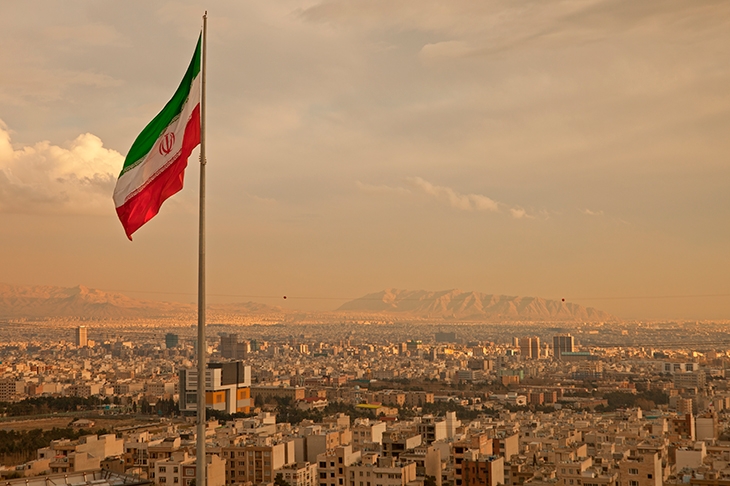Hard though it is to remember now, 2020 began with a very different dark cloud on the horizon. For a week or so it looked as if the West’s cold war with Iran would burst into full-scale conflict. The assassination by US forces of Iran’s revolutionary guard leader Qassem Soleimani on 3 January sent oil prices soaring and raised fears that President Trump’s reputation as a war-monger was finally to be deserved.
As we now know, the crisis fizzled into nothing. In retaliation, Iran halfheartedlyfired missiles at a couple of air bases in Iraq where US forces were stationed, killing no one. Donald Trump announced ‘all is well’ and, as he had already done with North Korea, succeeded in de-escalating a crisis which he was widely believed to be escalating.
Do we really feel that the world would be a better place if Iran had access to Russian missiles and Chinese tanks?
Yet, as government scientists keep telling us about Covid-19, Iran hasn’t gone away. Indeed, as the world worries about a resurgence of the virus, the issue of Iran seems to be erupting into its own second wave of the year. It now presents the UK government with its first foreign-policy challenge of the post-Brexit era.
In 2015, when the US was still under Barack Obama’s management, the UN Security Council passed the Joint Comprehensive Plan of Action (JCPOA) aimed at limiting Iran’s nuclear ambitions. Under the terms of the deal, Iran was to be subjected to a five-year embargo on the trade in conventional arms, but this is due to expire next month. Trump would like this to continue, and to that end triggered a clause in the agreement called ‘snapback’, which reimposes the ban on conventional arms sales. The trouble is that Trump withdrew America from the JCPOA two years ago, enabling other signatories to dismiss Trump’s move as un-enforceable.
For Britain, it revives the dilemma in which it has found itself so often in past decades, from airstrikes against Libya to the Iraq war to what to do about Assad in Syria: do we side with the hawkish Americans or the doveish Europeans? On 20 August Dominic Raab, the Foreign Secretary, made a seemingly decisive step: he joined France and Germany in writing to the UN Security Council arguing that the US’s attempt to invoke snapback had no force. So, while Britain has left the EU and is seen by some as drifting out into the North Atlantic as it comes more under US influence, on the issue of Iran the opposite seems to be true: Britain has anchored itself in Europe. It is the mirror image of 2002 when Tony Blair, a keener participant in the EU than any other prime minister since Edward Heath, nevertheless turned his back on majority European opinion over what to do about Saddam Hussein.
For critics of Brexit, it is a reminder that leaving the EU does not mean the end of European co-operation. Military interests and trade interests are two different matters — a point that was already clear from national approaches to Nato. For many years, France was out of Nato’s integrated command in spite of being at the heart of the then EEC. Norway, on the other hand, has been an unflinching member of Nato while declining to join the EU. Sweden is the reverse. It is not inevitable, therefore, that Britain must drift away militarily from Europe following Brexit.
That said, was Raab right to side with France and Germany to form what has become known as the E3? Some have pointed out that Britain has been trying to negotiate a trade deal with the US — an ambition whose chances have hardly been enhanced by rejecting the Trump administration’s efforts to keep Iran under an arms freeze. Then again, the Trump administration may be gone in months; for Britain to ingratiate itself with Trump might not exactly play well with an incoming Biden presidency, which appears more interested in the question of the Irish border. The way to a trade deal with Biden might well be to think multilaterally — and not upset the Democrats’ Irish lobby.
There is an alternative way of viewing the issue of Iran and the arms embargo: that Britain makes a decision based not on trade interests or on wider geopolitical issues but simply on the merits of the case. The question is, has Iran sufficiently demonstrated its peaceful intentions to allow it to be released from the arms embargo? The answer is surely no. Only a year ago Iran was interfering with international oil tankers in the Gulf of Oman. That is not the act of a peaceful nation but of one which is flexing its muscles. Do we really feel that the world would be a better place if Iran had access to imports of Russian missiles and Chinese tanks?
The letter sent to the UN by Raab and his counterparts in the E3 may technically be correct — if the US has opted out of the JCPOA, it is hard to see how it can expect to enact clauses within the agreement. Yet that does not make the US position wrong in principle. Iran has not changed its spots, and it is hard to see how it will. The five-year ban on selling conventional arms to Iran was put there in recognition that nuclear weapons are not everything: there is an awful lot of damage that a rogue state can do with conventional weapons. The weapons sanctions ought to be extended until Iran has done a lot more to prove it is a peaceful nation.






Comments